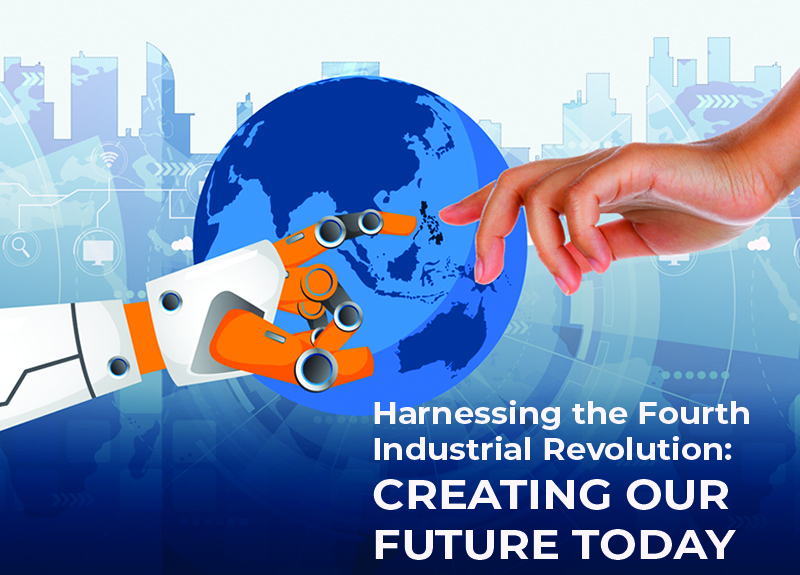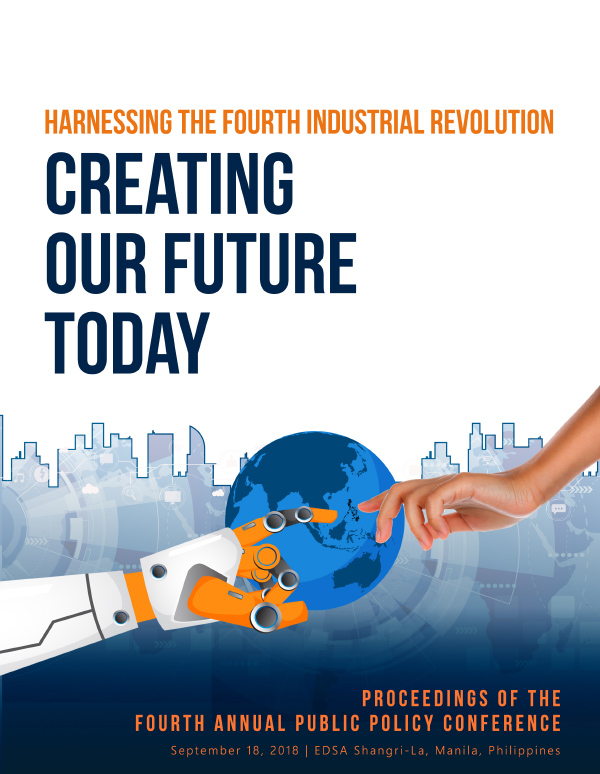The Philippine Institute for Development Studies dedicated the Fourth Annual Public Policy Conference (APPC) to the analysis of the Fourth Industrial Revolution (FIRe) and its emerging technologies. With the same theme as the DPRM, that is, “Harnessing the Fourth Industrial Revolution: Creating Our Future Today”, the event convened natural and social science experts and policy analysts from both public and private sectors to discuss the impacts of FIRe on various Philippine sectors, as well as the possible implications of FIRe for Philippine development policy and strategy. Such systematic analysis is critical to ensure that the country’s economic take-off is sustained in the long run and leads to even faster and more inclusive growth.
PIDS President Celia Reyes took note of the Readiness for the Future of Production Report 2018 of the World Economic Forum, which states that the country has been exhibiting weak performances in terms of technology and innovation, human capital, and institutional framework, among others. To address this issue, the PIDS official urged the government, policymakers, academe, and the private and business sector to come and work together to address current gaps so that the country can fully reap the benefits of FIRe. She also had the opportunity to introduce Sophia, a humanoid robot and United Nations Development Programme's Innovation Champion. Sophia urged those present in the event to harness the technologies of FIRe to speed up the social and economic development of the Philippines, leaving no one behind in the process.
Meanwhile, Socioeconomic Planning Secretary Ernesto Pernia, in his keynote speech, highlighted the importance of redefining the role of government in FIRe so that innovation activities are encouraged and not stifled. Pernia also emphasized the need to harness the benefits of the science, technology, and innovation ecosystem to the economy and society as articulated in the Philippine Development Plan 2017–2022. Specifically, he stressed the need to upgrade the country’s capabilities to produce and use technologies through capacity building and beefing up of research and development programs.
Despite the country’s apparent lack of readiness for FIRe, experts still agreed that Filipinos should remain optimistic toward it. For instance, Dr. Yasuyuki Sawada, chief economist at the Asian Development Bank (ADB), highlighted the fact that technological advancement can drive higher productivity, create better-paying jobs, and advance economic growth. He also dispelled the misconceptions about the impact of FIRe on jobs in the Philippines, arguing that only the routinary and manual jobs are at risk of being automated.
Meanwhile, Mr. Stephen Ezell, vice president of the Washington DC-based Information Technology and Innovation Foundation, highlighted the promise of FIRe technologies, particularly in terms of safety, personal mobility, as well as environmental and economic productivity. Ezell also explained that the emerging technologies, such as artificial intelligence and robotics, may even help the Philippines boost its annual productivity growth by as much as 1.5 percent. He also urged the Philippine government to adopt an innovation principle, not a precautionary principle. This means that the burden should be on the government to show that a new technology or a new business model will cause potential harm to society or consumer.
For his part, Mr. Jaime Augusto Zobel de Ayala, chair of Ayala Corporation, focused on the lack of linkages between education and employment, whose gap has continued to widen in recent years. While it is the role of the academe to equip the students with the needed skills, Zobel de Ayala explained that the industry must find ways to give feedback to ensure the quality and responsiveness of education. He also raised the need for a rebranding of the government’s technical certification to ensure that high school graduates can be employed even without a college degree.
Meanwhile, Dr. Elmer Dadios, professor at the De La Salle University-Manila, gave a real-life application of FIRe technologies. Among others, Dadios showcased the automated coconut production in Ragay, Camarines Sur, and the Contactless Apprehension of Traffic Violators on 24-Hour Basis All-Vehicle Detection System, or CATCH-ALL, a vision-based artificial intelligence analytics software with traffic and transport applications. He also presented his project, the “Game of Drones”, which aims to attract students to study robotics.
As in the past, the fourth APPC also included breakout sessions, focusing on four specific issues related to FIRe, namely, agriculture, manufacturing, and services for Session A, science, technology, and innovation for Session B, labor market and social protection for Session C, and human capital development for Session D.
Session A specifically sought to understand how new technologies are driving product and process innovation, shaping global production, consumption, and trade patterns in various industries. Session B, meanwhile, zeroed in on the discussion of the country’s limited human capital in research, the low levels of research and development expenditures, and weak linkages of actors in the innovation ecosystem. On the other hand, Session C discussed changes in the nature of work resulting from FIRe and their implications. Lastly, Session D focused on strategic investments in training people to have both soft skills and technical competencies required under the FIRe. The breakout sessions were then followed by the afternoon plenary session, where key government officials including Secretary Fortunato de la Peña of the Department of Science and Technology (DOST), Acting Secretary Eliseo Rio of the Department of Information and Communications Technology and Deputy Governor Diwa Guinigundo of the Bangko Sentral ng Pilipinas (BSP), and noted experts like Ramon Magsaysay Awardee Dr. Christopher Bernido, Academician Dr. Alvin Culaba, and Mr. Peter Draper of the University of Adelaide discussed how various stakeholders can work together to harness the powerful emerging FIRe technologies, achieve accelerated and broad-based socioeconomic development, and prepare for uncertainties arising from the unfolding landscape.
The conference was closed by Budget Secretary Benjamin Diokno who discussed the opportunities available in the new industrial revolution for modernizing and reforming government.
The APPC is the main and culminating activity of the Development Policy Research Month, a nationwide celebration led by PIDS to promote the importance of policy research in the formulation of evidence-based policies, programs, and projects in government. Since 2015, the APPC has gathered experts and researchers in the social sciences to discuss and recommend policies on current and emerging issues that need the attention of policymakers.
APPC 2018 was organized by PIDS with support from the ADB, BSP, DOST, Australian Embassy in the Philippines, Commission on Higher Education, Department of Foreign Affairs–Office of the Undersecretary for International Economic Relations, Department of Labor and Employment, Department of Trade and Industry, and Global Development Network.
CLICK THE IMAGE BELOW TO DOWNLOAD THE CONFERENCE PROCEEDINGS


